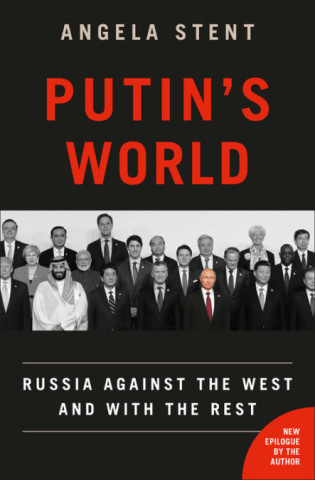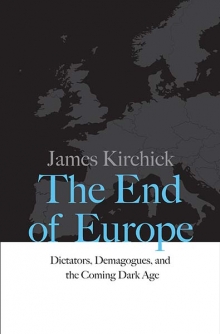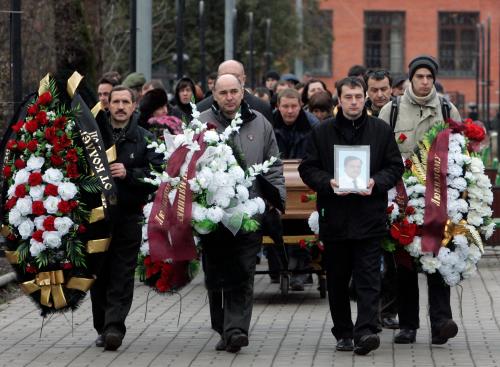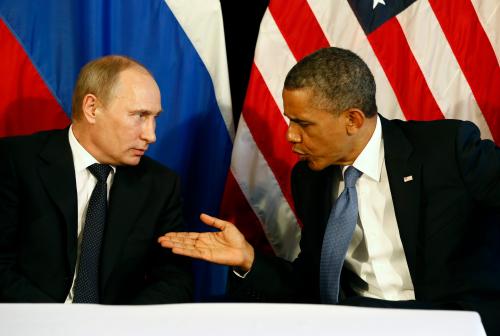Democrats lack self-awareness as to their own record regarding Russia, argues James Kirchick. This helps explain why conservatives have so much trouble taking liberal outrage about Russia seriously: Most of the people lecturing them for being “Putin’s pawns” spent the better part of the past eight years blindly supporting a Democratic president, Barack Obama, whose default mode with Moscow was fecklessness. This piece originally appeared on Politico. You can read Kirchick’s related piece—”How the GOP became the party of Putin”—here.
Democrats are exasperated that Republicans don’t share their outrage over the ever-widening scandal surrounding Donald Trump and Russia. The president’s personal solicitousness toward Vladimir Putin, the alacrity of his son in welcoming potential assistance from Russians during the 2016 campaign, and mounting questions as to whether Trump associates colluded with Russia as part of its influence operation against Hillary Clinton are leading Democrats to speak of impeachment and even treason.
As a longtime Russia hawk who has spent most of the past decade covering Kremlin influence operations across the West, I share their exasperation. Over the past year, I have authored pieces with headlines like “How Putin plays Trump like a piano,” “How Trump got his party to love Russia,” and, most recently in this space, “How the GOP became the party of Putin.” As I see it, conservatives’ nonchalance about Russia’s attempt to disrupt and discredit our democracy ranks as one of the most appalling developments in recent American political history.
But as much as Democrats may be correct in their diagnosis of Republican debasement, they are wholly lacking in self-awareness as to their own record regarding Russia. This helps explain why conservatives have so much trouble taking liberal outrage about Russia seriously: Most of the people lecturing them for being “Putin’s pawns” spent the better part of the past eight years blindly supporting a Democratic president, Barack Obama, whose default mode with Moscow was fecklessness. To Republicans, these latter-day Democratic Cold Warriors sound like partisan hysterics, a perception that’s not entirely wrong.
Consider the latest installment of the unfolding Trump-Russia saga: Donald Trump Jr.’s meeting last summer with a Russian lawyer promising dirt on Clinton. Before inexplicably publicizing his own email correspondence, which revealed him eager to accept information that would allegedly “incriminate” his father’s opponent, Trump Jr. claimed the confab concerned nothing more salacious than the issue of “adoption.” Democrats have rightly pointed out that this was a ruse: When the Russian government or its agents talk about international adoption, they’re really talking about the Magnitsky Act, a 2012 measure sanctioning Russian human rights abusers named after a Russian lawyer tortured to death after exposing a massive tax fraud scheme perpetrated by government officials. The law’s passage so infuriated Putin that he capriciously and cruelly retaliated by banning American adoption of Russian orphans. Five years after its enactment, the law continues to rankle Russia’s president. According to Trump himself, it was the ostensibly innocuous issue of “adoption” that Putin raised with him during a previously undisclosed dinner conversation at the G-20 summit in Hamburg earlier this month.
Yet for all the newfound righteous indignation in defense of the Magnitsky Act being expressed by former Obama officials and supporters, it wasn’t long ago that they tried to prevent its passage, fearing the measure would hamper their precious “reset” with Moscow. In 2012, as part of this effort, the Obama administration lobbied for repeal of the Jackson-Vanik amendment, a Cold War-era law tying enhanced trade relations with Russia to its human rights record. Some voices on Capitol Hill proposed replacing Jackson-Vanik with Magnitsky, a move the administration vociferously opposed. Shortly after his appointment as ambassador to Moscow, Michael McFaul (today one of the most widely cited critics on the subject of Trump and Russia) publicly stated that the Magnitsky Act would be “redundant” and that the administration specifically disagreed with its naming and shaming Russian human rights abusers as well as its imposition of financial sanctions. McFaul even invoked the beleaguered Russian opposition, which he said agreed with the administration’s position.
This was a mischaracterization of Russian civil society, the most prominent leaders of which supported repeal of Jackson-Vanik only on the express condition it be superseded by the Magnitsky Act. “Allowing [Jackson-Vanik] to disappear with nothing in its place … turns it into little more than a gift to Mr. Putin,” Russian dissidents Garry Kasparov and Boris Nemtsov wrote for the Wall Street Journal days after McFaul’s remarks. (Nemtsov, one of Putin’s loudest and most visible critics, was assassinated in 2015 just a few hundred meters from the Kremlin walls). Anti-corruption activist Alexei Navalny, meanwhile, wrote that while he supported repealing Jackson-Vanik, “no doubt the majority of Russian citizens will be happy to see the U.S. Senate deny the most abusive and corrupt Russian officials the right of entry and participation in financial transactions in the U.S., which is the essence of the Magnitsky Bill.”
Nevertheless, the Obama administration not only persisted in opposing Magnitsky, but continued to claim that it had the support of the Russian opposition in this endeavor. “Leaders of Russia’s political opposition,” then-Secretary of State Hillary Clinton wrote in an op-ed for The Wall Street Journal, “have called on the U.S. to terminate Jackson-Vanik, despite their concerns about human rights and the Magnitsky case.” Despite administration protestations, Congress passed the Magnitsky Act and Obama reluctantly signed it into law. Reflecting on the legislative battle two years later, Bill Browder, the London-based investor for whom Magnitsky worked and the driving force behind the bill, told Foreign Policy, “The administration, starting with Hillary Clinton and then John Kerry, did everything they could do to stop the Magnitsky Act.”
Today’s liberal Russia hawks would have us believe that they’ve always been clear-sighted about Kremlin perfidy and mischief. They’re displaying amnesia not just over a single law but the entire foreign policy record of the Obama administration. From the reset, which it announced in early 2009 just months after Russia invaded Georgia, to its removal of missile defense systems in the Czech Republic and Poland later that year, to its ignoring Russia’s violations of the 1987 Intermediate-Range Nuclear Forces Treaty (while simultaneously negotiating New START) and its ceding the ground in Syria to Russian military intervention, the Obama administration’s Russia policy was one, protracted, eight-year-long concession to Moscow. Throughout his two terms in office, Obama played down the threat Russia posed to America’s allies, interests and values, and ridiculed those who warned otherwise. “The traditional divisions between nations of the south and the north make no sense in an interconnected world nor do alignments of nations rooted in the cleavages of a long-gone Cold War,” Obama lectured the United Nations General Assembly in 2009, a more florid and verbose way of making the exact same criticism of supposed NATO obsolescence that liberals would later excoriate Trump for bluntly declaring.
When it abandoned missile defense installations in Poland and the Czech Republic that same year—announcing the decision on the anniversary of the Soviet Union’s invasion of Poland, no less—the Obama administration insisted that the move wasn’t about kowtowing to Moscow but rather more robustly preparing for the looming Iranian threat. Notwithstanding the merits of that argument, perception matters in foreign policy, and the perception in Central and Eastern Europe was that America was abandoning its friends in order to satiate an adversary. That characterizes the feelings of many American allies during the Obama years, whether Israelis and Sunni Arabs upset about a perceived tilt to Iran, or Japanese concerned about unwillingness to confront a revisionist China. Liberals are absolutely right to criticize the Trump administration for its alienation of allies. But they seem to have forgotten the record of the man who served as president for the eight years prior.
Three years later, in the midst of what he thought was a private conversation about arms control with then-Russian President Dmitri Medvedev, Obama was famously caught on an open microphone promising that he would have “more flexibility” (that is, be able to make even more concessions to Moscow) after the presidential election that fall. (Imagine the uproar if Trump had a similar hot mic moment with Putin.) Later that year, after Mitt Romney suggested Russia was America’s “No. 1 geopolitical foe,” Obama ridiculed his Republican challenger. “The 1980s are now calling and they want their foreign policy back,” Obama retorted, in a line that has come back to haunt Democrats. An entire procession of Democratic politicians, foreign policy hands and sympathetic journalists followed Obama’s lead and repeated the critique. According to soon-to-be secretary of state John Kerry, Romney’s warning about Russia was a “preposterous notion.” His predecessor Madeleine Albright said Romney possessed “little understanding of what is actually going on in the 21stcentury.”
This wasn’t merely a debate talking point. Downplaying both the nature and degree of the Russian menace constituted a major component of mainstream liberal foreign policy doctrine until about a year ago—that is, when it became clear that Russia was intervening in the American presidential race against a Democrat. It provided justification for Obama’s humiliating acceptance in 2013 of Russia’s cynical offer to help remove Syrian chemical weapons after he failed to endorse his own “red line” against their deployment. Not only did that deal fail to ensure the complete removal of Bashar Assad’s stockpiles (as evidenced by the regime’s repeated use of such weapons long after they were supposedly eliminated), it essentially opened the door to Russian military intervention two years later.
Even after Putin annexed Crimea in 2014, the first violent seizure of territory on the European continent since World War II, Obama continued to understate the severity of the Russian threat. Just a few weeks after the annexation was formalized, asked by a reporter if Romney’s 2012 statement had been proven correct, Obama stubbornly dismissed Russia as “a regional power that is threatening some of its immediate neighbors not out of strength but out of weakness.” Truly. Russia is such a “regional power” that it reached across the Atlantic Ocean and intervened in the American presidential election, carrying out what Democrats today rightly claim was the most successful influence operation in history. “It is the hardest thing about my entire time in government to defend,” a senior Obama official, speaking of the administration’s halfhearted response to Russia’s intrusion, told the Washington Post. “I feel like we sort of choked.”
Yet rarely in the course of accusing Trump of being a Kremlin agent have liberals—least of all the president they so admire—reflected upon their hypocrisy and apologized to Romney, whose prescience about Russia, had he been elected in 2012, may very well have dissuaded Putin from doing what he did on Obama’s watch. In Obama, Putin rightly saw a weak and indecisive leader and wagered that applying the sort of tactics Russia uses in its post-imperial backyard to America’s democratic process would be worth the effort. The most we’ve seen in the way of atonement are Clinton’s former campaign spokesman Brian Fallon admitting on Twitter, “We Dems erred in ’12 by mocking” Romney, and Obama speechwriter Jon Favreau sheepishly conceding, with a chuckle, “we were a little off.” If Obama feels any regret, maybe he’s saving it for the memoir.
But even if liberals do eventually show a modicum of humility and acknowledge just how catastrophically wrong they were about Romney, this would not sufficiently prove their seriousness about Russia. For their current criticisms of the Trump administration to carry water, liberals will have to do more than simply apologize for regurgitating Obama’s insult that Republicans are retrograde Cold Warriors. They will have to renounce pretty much the entire Obama foreign policy legacy, which both underestimated and appeased Russia at every turn. Otherwise, their grave intonations about “active measures,” “kompromat” and other Soviet-era phenomena will continue sounding opportunistic, and their protestations about Trump being a Russian stooge will continue to have the appearance of being motivated solely by partisan politics.
For now, the newfangled Democratic hawkishness on Russia seems motivated almost entirely, if not solely, by anger over the (erroneous) belief that Putin cost Clinton the election—not over the Kremlin’s aggression toward its neighbors, its intervention on behalf of Assad in Syria, its cheating on the Intermediate-Range Nuclear Force Treaty, or countless other malfeasances. Most Democrats were willing to let Russia get away with these things when Obama was telling the world that “alignments of nations rooted in the cleavages of a long-gone Cold War” are obsolete, or that Russia was a mere “regional power” whose involvement in Syria would lead to another Afghanistan, or when he was trying to win Russian help for his signal foreign policy achievement, the Iran nuclear deal. If the Democrats’ newfound antagonism toward the Kremlin extended beyond mere partisanship, they would have protested most of Obama’s foreign policy, which acceded to Russian prerogatives at nearly every turn. As the former George W. Bush speechwriter Matt Latimer cleverly imagined in these pages, had Trump ran for president and won with the assistance of Russia but as a Democrat instead of a Republican, it’s not difficult to imagine Democrats being just as cynical and opportunistic in their dismissal of the Russia scandal as Republicans are today.
Democrats’ lack of introspection about their past policy failures, along with their amateurish, newfound zeal for opposing Russia, hurts the wider effort to convince the American public that Russian meddling in our democracy is a serious issue. The most credible voices in this discussion are those genuinely knowledgeable about Russia’s grand strategy to disrupt Western democracy, of which the Trump case is but one element of a long-running global campaign. Not coincidentally, these people have also been consistent in their hawkishness across presidential administrations, as willing to confront the Obama administration over its failures as they are today lambasting Trump. Yet largely because of a media preference for sensationalism, these nuanced voices are being drowned out in favor of Democratic partisans and internet conspiracy theorists peddling wild accusations of “treason.” Most liberals, to put it bluntly, are new to the cause, and their obvious overcompensation and shrill rhetoric is degrading our civic culture. “We were and are under attack by a hostile foreign power and … we should be debating how many sanctions we should place on Russia or whether we should blow up the KGB, GSU [sic], or GRU,” Democratic factotum Paul Begala recently blathered on CNN, referring to, successively, the Soviet-era intelligence service, a non-existent agency, and Russian military intelligence. On Twitter, MSNBC host Joy Reid recently opined, apropos of nothing, that “Donald Trump married one American (his second wife) and two women from what used to be Soviet Yugoslavia: Ivana-Slovakia, Melania-Slovenia.”
Put aside the weird, inquisitorial implication that Trump, solely by virtue of his having married two women from the former Eastern bloc, must therefore be a Russian mole. Reid’s assertion managed to fit three basic errors into a single sentence: 1) Ivana Trump was born in the present-day Czech Republic, not Slovakia 2) Slovakia, furthermore, was never part of Yugoslavia and 3) Yugoslavia, though socialist, was never part of the Soviet Union and famously resisted incorporation into the Warsaw Pact. This is what happens when partisan Democrats who never expressed an iota of interest in Russia before June 2016 try to impersonate Scoop Jackson: They end up sounding like a less methodical Joe McCarthy.
Taken too far, liberals’ Russia obsession could hurt them. Many Democrats seem to genuinely believe that Putin is the only reason Clinton isn’t America’s first female president. Seeing Russian meddling as the single or most significant explanation for their electoral woes conveniently lets Democrats ignore the many other factors—a lousy candidate, an uninspiring and unconvincing platform, a left-wing identity politics that alienates many Americans, just to name a few—that thwarted what ought to have been an easy victory against the most toxic and unqualified individual ever to run for president. While the American people certainly need to be better educated about the breadth of Kremlin influence operations and the multifarious ways Russia threatens the free world, a fixation on Russia to the exclusion of all else will not win elections.
Hypocrisy is no stranger to politics, of course, and it’s never too late for people to come around to the realization that Russia poses a danger. But with Democrats seriously talking about impeachment or even treason, a reckoning is in order. Constantly harping on Trump’s strange affinity for Putin and suspicious connections to Russia isn’t sufficient; the far more substantive policy concessions made to Russia by the previous administration did at least as much damage to American interests, if not more. Are liberals willing to admit the reset was a giant miscalculation from the start? Are they willing to support sending arms to Ukraine? To redeploy missile defense systems to allies in Eastern Europe? Are they willing to concede that Obama’s Syria policy was an epic disaster that paved the way for Russia’s reemergence as a Middle Eastern military power? Are they, in other words, willing to renounce the foreign policy legacy of one of their most popular leaders? Because only that will demonstrate they’re serious about confronting Russia. Anything short reeks of partisanship.









Commentary
Why it’s hard to take Democrats seriously on Russia
July 27, 2017